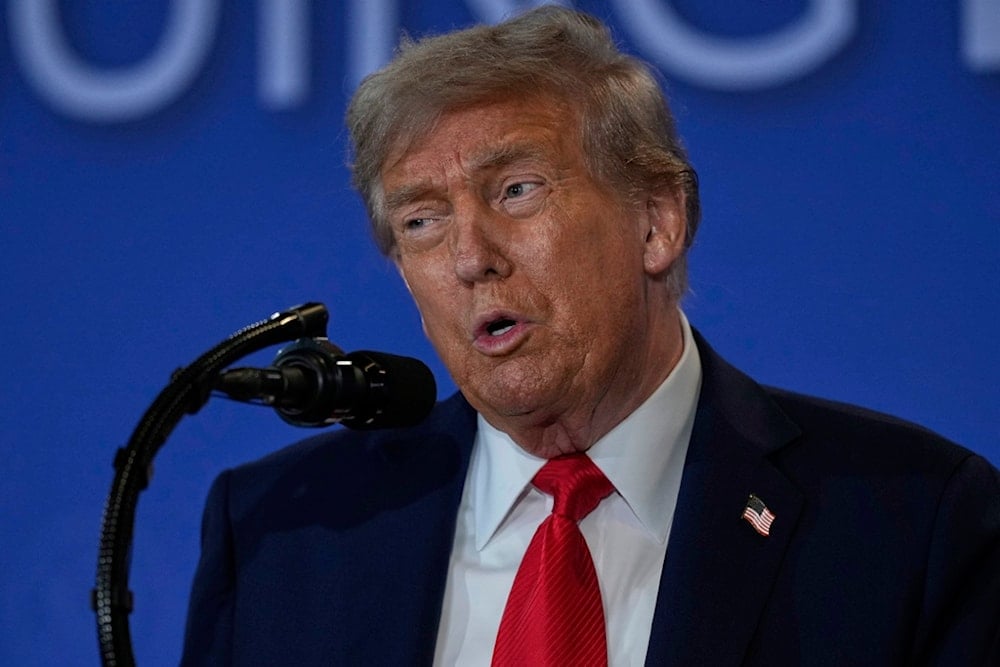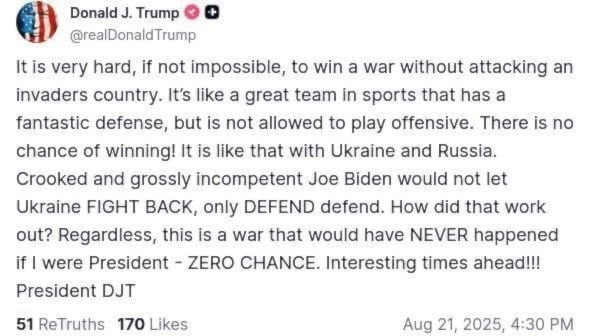Trump hints at Russia escalation, claims Biden limited Kiev offense
US President Trump reignited his criticism of Joe Biden over the Ukraine war, claiming the conflict would never have happened under his leadership.
-

President Donald Trump speaks during a news conference with Russia's President Vladimir Putin at Joint Base Elmendorf-Richardson, Alaska, Friday, Aug. 15, 2025. (AP)
US President Donald Trump on Thursday revisited the origins of the ongoing war between Russia and Ukraine, sharply criticizing his predecessor Joe Biden's approach and claiming the conflict would have been avoided had he been in office at the time.
In a post on his social media platform, Trump compared Ukraine's struggle against Russia to a sports team forbidden from attacking. "It is very hard, if not impossible, to win a war without attacking an invaders country. It's like a great team in sports that has a fantastic defense, but is not allowed to play offensive. There is no chance of winning! It is like that with Ukraine and Russia," Trump wrote.
-

Trump's post on Truth Social
He directly blamed Biden for limiting Ukraine's options in the early stages of the conflict: "Crooked and grossly incompetent Joe Biden would not let Ukraine FIGHT BACK, only DEFEND defend. How did that work out?"
Trump further claimed that the war itself was avoidable, insisting, "This is a war that would have NEVER happened if I were President – ZERO CHANCE." He concluded the post by declaring, "Interesting times ahead!!!"
Prospects of peace to become clearer
Later the US president spoke to The Todd Starnes Show, a conservative talk radio program, were he said that the prospects for peace between Ukraine and Russia will become clear "within two weeks."
"Well, I will let you know about, I would say within two weeks, we are going to know one way or the other," Trump said, when asked about peace between the countries.
"After that, we’ll have to maybe take a different tact, but we will see. But we will know pretty soon," he said.
Trump's 'peace' push
The remarks reflect Trump's long-standing argument that his brand of diplomacy, particularly his direct engagement with Vladimir Putin, would have prevented Russia's invasion altogether. Since returning to office in 2025, he has sought to pivot from criticism toward shaping a possible peace process.
In recent meetings, Trump has assured Ukrainian President Volodymyr Zelensky that Washington would help guarantee Ukraine's security under a future agreement, while also pressing European allies to shoulder more of the responsibility.
At the same time, Western military planners have been drawing up a range of proposals to strengthen Ukraine's defenses. While Trump has made clear that he will not authorize US ground troops, he has left open the possibility of limited measures such as air support or a no-fly zone to back any eventual peace deal.
His shift from calling for a short-term ceasefire to advocating a comprehensive settlement has unsettled Kiev and some European capitals, who worry that such an approach could entrench Russia's territorial gains and weaken Ukraine's position.
Read more: Zelensky urges strong US response if Putin refuses talks
Trump’s fragile diplomacy
Critics have warned that Trump's strategy risks sacrificing Ukraine's sovereignty under the banner of peace. Rights advocates have stressed that the war is not simply about borders but about safeguarding democratic governance in Europe. Others have pointed to Trump's uneven diplomatic record and questioned whether his unconventional approach can deliver long-term stability.
Moscow, meanwhile, has reacted carefuly to Trump’s latest statements. Kremlin spokesperson Dmitry Peskov noted that Trump’s words were "serious and require analysis," signaling that Russia is watching his moves carefully but not rushing to endorse them.
Foreign Minister Sergey Lavrov reiterated that any genuine security guarantees for Ukraine must include Russia at the table, warning that talks excluding Moscow would be "a road to nowhere."
President Vladimir Putin has indicated a willingness to meet Zelensky under the right conditions, but Russian officials continue to emphasize that their participation in peace negotiations is non-negotiable.

 4 Min Read
4 Min Read











